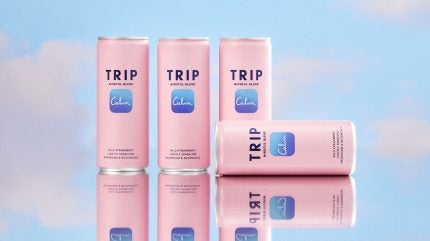
An advert from UK CBD drinks brand Trip has been banned by the local advertising watchdog over several health and nutrition claims.
Last December, Trip promoted a product that did not contain CBD in an online ad.

Discover B2B Marketing That Performs
Combine business intelligence and editorial excellence to reach engaged professionals across 36 leading media platforms.
The cucumber and mint beverage came from the company’s Mindful Blend range, includes a blend of magnesium, Lion’s Mane and other ingredients.
Among the claims in the advert was that the drink could “help you feel calm”.
The Advertising Standards Authority (ASA) upheld three complaints linked to the advert. The complaints centred on claims the drink reduced stress, promoted feelings of calm and whether a “0g added sugar” nutrition claim breached UK ad rules.
The ASA said the advert “implied the magnesium in the product could reduce serum cortisol levels” and included phrases that indicated the product would help consumers relax.

US Tariffs are shifting - will you react or anticipate?
Don’t let policy changes catch you off guard. Stay proactive with real-time data and expert analysis.
By GlobalDataIt also ruled the claims around the anxiety and stress reducing aspects of Lion’s Mane “were claims that a food could prevent, treat or cure disease”, which is prohibited by the watchdog’s CAP code.
“We considered those claims were specific health claims for the purposes of the code, because they implied that the ingredients had beneficial health effects,” the ASA said.
“However, we had not seen any evidence which demonstrated that those claims were authorised on the GB Register and they therefore breached the Code.”
Under the code, health claims can only be used in marketing of food and food supplements if they have been authoritised on the GB register.
Commenting on the ruling, Rachael Matthews, product director at Trip, said: “All statements regarding the relevant product’s calming properties were based on real world studies conducted with human participants.
“We will update our advertising and continue to work closely with regulators to ensure that Trip can continue to educate consumers about the functionality of ingredients in its drinks whilst complying with all applicable regulatory requirements.”
The third complaint upheld by the ASA was around a claim in the advert that the drink contained “0g added sugar”.
According to the ASA, such a claim indicates a product is “with no added sugars”, though the use of the claim, it said, was allowed “only where a product did not contain any added omo- or disaccharides, or any other food used for its sweetening properties”.
Given the product contained erythritol and stevia sweeteners, and naturally occuring sugars from fruit concentrate, the ASA ruled the “0g added sugar” claim “did not comply with the conditions of use associated with the equivalent ‘with no added sugars’ nutrition claim and therefore breached the code”.
Matthews added: “All sugar used in Trip drinks is naturally occurring from fruit juice. As recognised in the Advertising Standards Authority’s ruling, such fruit juice is used for its contribution to a number of different functional aspects of the drinks.
“In accordance with the ruling, Trip is taking steps to change its advertising of the relevant product to make this clearer to consumers.”





